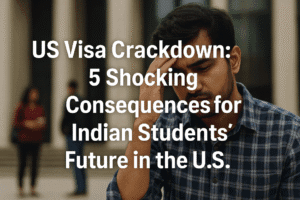US Visa Crackdown: 5 Shocking Consequences for Indian Students’ Future in the U.S.
A surge in U.S. visa cancellations, particularly affecting Indian students, has disrupted the lives of thousands, with nearly half of reported cases involving Indian nationals. The termination of SEVIS records, which immediately halts employment for OPT students, has left many in legal and financial limbo. Minor infractions, such as unpaid parking tickets, are increasingly triggering these cancellations, despite many charges being dropped.
With over 332,000 Indian students studying in the U.S., this issue highlights systemic flaws, particularly in Texas, where numerous students faced abrupt terminations. These disruptions not only jeopardize the careers and stability of international students but also threaten the U.S.’s economic and academic future. AILA advocates for clear guidelines, appeal mechanisms, and sensitivity training to address these challenges. Without reform, the U.S. risks alienating global talent and undermining its position as a leader in innovation.

US Visa Crackdown: 5 Shocking Consequences for Indian Students’ Future in the U.S.
A recent surge in U.S. visa cancellations has cast a shadow over the aspirations of thousands of international students, with Indian nationals bearing the brunt of these disruptions. According to a policy brief by the American Immigration Lawyers Association (AILA), nearly 50% of 327 reported visa cancellations or SEVIS terminations involved Indian students, followed by Chinese nationals (14%). The findings highlight systemic challenges in U.S. immigration processes, particularly for graduates relying on work opportunities to sustain their careers.
Why OPT Students Are Most Vulnerable
The Optional Practical Training (OPT) program, which allows international graduates to work in the U.S. for up to three years, has become a minefield for students. Termination of SEVIS records—a federal system tracking student visas—immediately halts their employment, leaving many in legal and financial limbo. Reinstating status is especially arduous for OPT participants, as they lack the safety net of university enrollment.
Disturbingly, minor encounters with law enforcement, such as unpaid parking tickets or speeding violations, are increasingly triggering these cancellations. In most cases, charges were dropped, yet students faced disproportionate consequences. Only a handful of cases linked to political activism were reported, suggesting broader inconsistencies in enforcement.
India’s Dominance in U.S. Education—and Risk Exposure
India sends the largest cohort of students to the U.S.—over 332,000 in 2023–24—with nearly 97,500 enrolled in OPT. This sheer volume partly explains their overrepresentation in cancellation statistics. However, deeper issues may lie in heightened scrutiny of visa holders from certain countries or universities.
The Texas Example: A Microcosm of Systemic Flaws
In Texas, 118 international students recently found their SEVIS records abruptly terminated, upending their lives. Unlike visa revocations, which bar re-entry but allow continued stay, SEVIS terminations instantly invalidate legal status, stripping work rights and jeopardizing dependents’ visas. For many, this means abandoning jobs, research projects, or even family stability overnight.
Broader Implications: Trust and Economic Impact
The U.S. has long been a magnet for global talent, with international students contributing $40 billion annually to the economy. However, erratic visa policies risk deterring future applicants. Indian students, in particular, may reconsider the U.S. in favor of more predictable destinations like Canada or Australia, where post-study work pathways are clearer.
Universities, too, face collateral damage. Enrollment declines could strain budgets, while academic collaborations suffer if scholars perceive the U.S. as unwelcoming.
The Human Toll: Dreams Deferred
Behind the statistics are stories of anxiety and shattered plans. Imagine a graduate on OPT, employed at a tech firm, suddenly unable to work due to a resolved traffic ticket. Or a PhD candidate in Texas forced to abandon research midstream. These disruptions extend beyond paperwork—they erode trust in the American Dream.
Pathways Forward
AILA urges reforms to prevent minor infractions from derailing lives. Suggestions include:
- Transparent Guidelines: Clear criteria for SEVIS terminations to avoid arbitrary decisions.
- Appeal Mechanisms: Streamlined processes for students to contest cancellations.
- Sensitivity Training: Educating enforcement agencies on the impact of minor violations.
Conclusion: Balancing Security and Opportunity
While national security remains paramount, the current approach risks alienating talent vital to U.S. innovation. For students investing years and savings into U.S. education, stability is not a luxury—it’s a necessity. Addressing these challenges isn’t just about policy tweaks; it’s about reaffirming America’s commitment to those who seek to contribute to its future.
As debates continue, one truth emerges: The stakes are as much human as they are bureaucratic. How the U.S. responds could shape its global standing as a land of opportunity for decades to come.
You must be logged in to post a comment.